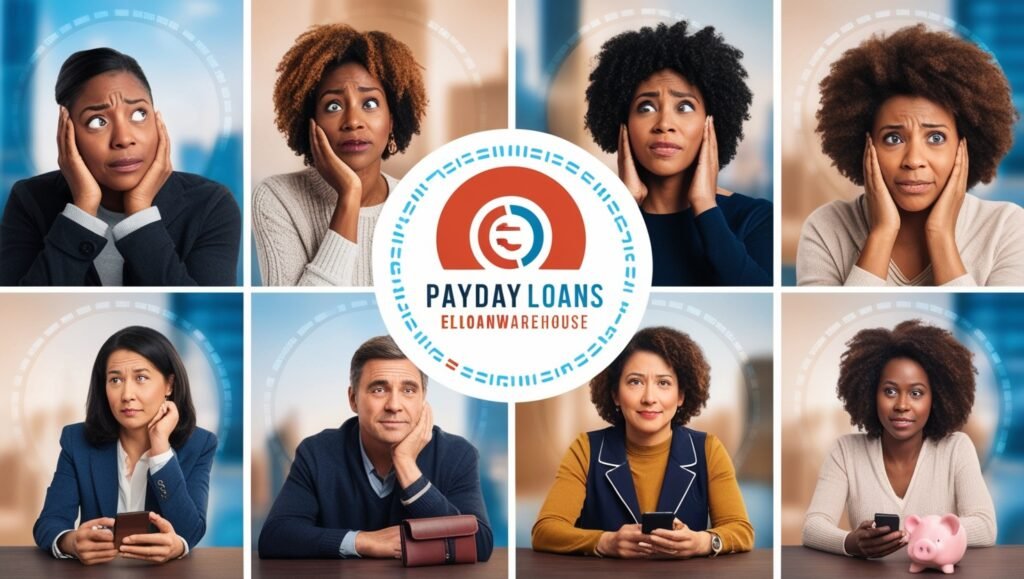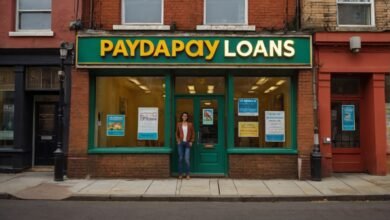
“Payday Loans and Eloanwarehouse: A Comprehensive Overview”
Introduction:
Payday loans are short-term, high-interest loans designed to provide borrowers with quick access to cash, typically to cover unexpected expenses or urgent financial needs. These loans are often marketed as a solution for those who live paycheck to paycheck, providing a temporary financial lifeline until the borrower’s next payday.
Eloan warehouse is one of the many online platforms that facilitate payday loans, offering services to individuals who may not have access to traditional forms of credit. This article delves into the payday loan industry, the role of eloanwarehouse, the impact of payday loans on consumers, and the broader financial and regulatory landscape.Click here

History of Payday Loans:
The concept of payday lending has roots that stretch back centuries, with informal lending practices existing long before the modern financial system. However, the payday loan industry as we know it today began to take shape in the late 20th century. The industry grew rapidly in the 1990s and early 2000s, fueled by deregulation in the financial sector and increasing demand for short-term credit.
Initially, payday loans were primarily offered by storefront lenders in low-income neighborhoods. These lenders operated under the radar, often in regions with lax regulatory oversight. As the industry grew, it attracted more attention from both regulators and the public, leading to increased scrutiny and, eventually, more stringent regulations.
The rise of the internet in the late 1990s and early 2000s brought about significant changes in the payday loan industry. Online payday lenders emerged, offering consumers a more convenient way to access short-term credit. This shift also allowed payday lenders to reach a broader audience, including individuals in regions where storefront payday lending was heavily regulated or even banned.
Understanding Payday Loans:
Payday loans are typically small-dollar loans, ranging from $100 to $1,000, depending on state regulations. They are designed to be repaid in full on the borrower’s next payday, usually within two weeks to a month. To obtain a payday loan, borrowers must provide proof of income, a bank account, and a post-dated check or authorization for an electronic debit.Unlike traditional loans, payday loans do not require a credit check, making them available to individuals with poor credit or no credit history.
However, the ease of access comes at a high cost. The annual percentage rate (APR) for a payday loan can exceed 400%, making them one of the most expensive forms of credit available. For example, a $500 payday loan with a 15% fee would cost the borrower $75, resulting in an APR of 391% if the loan is repaid in two weeks.
The typical payday loan borrower is often someone facing financial hardship. Many borrowers live paycheck to paycheck, with little to no savings to cover unexpected expenses. Payday loans may provide a temporary solution, but the high costs can make it difficult for borrowers to repay the loan in full. As a result, many borrowers end up rolling over their loans, incurring additional fees and interest, and falling deeper into debt.
Eloanwarehouse, A Case Study:
Eloanwarehouse is an online platform that connects borrowers with lenders offering payday loans and other short-term financial products. The platform is designed to make the payday loan application process quick and convenient, allowing borrowers to apply for loans from the comfort of their homes.
One of the key features of eloanwarehouse is its ability to match borrowers with multiple lenders, increasing the chances of approval. The platform offers a variety of loan options, including payday loans, installment loans, and personal loans. This diversity allows borrowers to choose a loan product that best fits their needs and repayment capacity.
Compared to traditional storefront payday lenders, eloanwarehouse offers several advantages. The online application process is more accessible, especially for individuals in remote areas or those with mobility issues. Additionally, eloanwarehouse provides borrowers with a wider range of loan options, giving them more flexibility in terms of loan amounts and repayment terms.
However, eloanwarehouse, like many other online payday lenders, has faced criticism for its high interest rates and fees. While the platform offers convenience and accessibility, the cost of borrowing remains high, and the risk of falling into a cycle of debt is ever-present. Critics argue that platforms like eloanwarehouse may exploit financially vulnerable individuals, offering them quick cash at the expense of long-term financial stability.
Impact of Payday Loans:
The impact of payday loans on borrowers can be profound, affecting their financial health, emotional well-being, and overall quality of life. The high cost of payday loans can quickly erode a borrower’s financial stability, leading to a cycle of debt that is difficult to escape.
Financially, payday loans can trap borrowers in a vicious cycle of borrowing and repayment. When borrowers are unable to repay their loans on time, they often roll over the loan or take out another payday loan to cover the original debt. Each rollover incurs additional fees and interest, increasing the total cost of the loan. Over time, borrowers may find themselves paying far more in fees and interest than the original loan amount.
The socioeconomic impact of payday loans is also significant. Borrowers who rely on payday loans are often those with the least financial resources, and the high cost of these loans can push them further into poverty.
The psychological effects of payday loans should not be overlooked. In extreme cases, the financial pressure from payday loans can contribute to mental health crises, including depression and suicidal ideation.
Regulatory Environment:
The payday loan industry operates in a complex and often contentious regulatory environment. In the United States, payday lending is regulated at both the federal and state levels, with significant variations in laws and regulations across different states.
At the federal level, the Consumer Financial Protection Bureau (CFPB) plays a key role in overseeing payday lenders and protecting consumers. The CFPB has implemented several rules aimed at curbing abusive payday lending practices, such as requiring lenders to assess a borrower’s ability to repay the loan before issuing credit. However, these regulations have faced legal challenges and opposition from industry groups, leading to ongoing debates over the appropriate level of regulation.
State regulations on payday lending vary widely. Some states have imposed strict limits on interest rates and fees, effectively banning payday loans. Others have more lenient regulations, allowing payday lenders to operate with minimal oversight. The patchwork of state laws has created a fragmented regulatory landscape, with significant differences in consumer protections depending on where a borrower lives.
The regulatory environment for online payday lenders, like eloanwarehouse, is particularly complex. Online lenders often operate across state lines, making it difficult for individual states to enforce their regulations. This has led to calls for more uniform federal regulations that would apply to all payday lenders, regardless of where they are located.

Alternatives to Payday Loans:
Given the high costs and risks associated with payday loans, it is important for consumers to be aware of alternative options. Several alternatives to payday loans can provide more affordable and sustainable solutions for those in need of short-term credit.
One alternative is credit unions, which often offer small-dollar loans with lower interest rates and more favorable terms than payday loans. These loans typically have lower interest rates, longer repayment terms, and no hidden fees.
Employer-sponsored loans and advances are another option for those in need of quick cash. Some employers offer short-term loans or paycheck advances to employees as part of their benefits package. These loans are often interest-free or have very low interest rates, making them a more affordable option than payday loans.
“Credit Unions and Personal Loans”
Credit Unions: A Viable Alternative:
Unlike payday lenders, credit unions operate with a focus on serving their members’ best interests, often providing loans at significantly lower interest rates. Personal loans from credit unions typically come with more manageable repayment terms, lower fees, and a more transparent lending process.
One of the most compelling alternatives to payday loans is the Payday Alternative Loan (PAL) offered by many credit unions. The National Credit Union Administration (NCUA) has set guidelines for PALs, including a maximum loan amount of $2,000, repayment terms ranging from one to 12 months, and an APR cap of 28%. These loans also have minimal fees, making them a more affordable and sustainable option for borrowers.
Personal Loans: A Flexible Solution:
Personal loans from credit unions or banks offer another alternative to payday loans. These loans can be used for a variety of purposes, from consolidating debt to covering emergency expenses. Personal loans typically have lower interest rates than payday loans, longer repayment terms, and fixed monthly payments, making them easier to manage over time.
Borrowers with good credit may qualify for the best rates, but even those with less-than-perfect credit can find personal loans with terms that are far more favorable than payday loans. Additionally, many online lenders now offer personal loans with quick approval processes and competitive rates, making them accessible to a wider range of borrowers.
“Employer-Sponsored Loans and Advances”
Employer-Sponsored Loans: A Growing Trend:
In response to the growing need for affordable short-term credit, some employers have begun offering employer-sponsored loans and advances as part of their employee benefits package. These programs allow employees to borrow money directly from their employer, often at little to no interest. Repayments are typically deducted from the employee’s paycheck over time, making it easier to manage the loan without incurring additional debt.
Employer-sponsored loans can be an excellent alternative to payday loans, providing quick access to funds without the high costs associated with traditional payday lending. Additionally, these loans often come with more flexible repayment terms, allowing employees to repay the loan over several pay periods rather than in a single lump sum.
Paycheck Advances: A Lifeline for Workers:
Another option offered by some employers is paycheck advances, which allow employees to access a portion of their earned wages before their scheduled payday. This can be particularly helpful for workers who need immediate cash to cover unexpected expenses. Paycheck advances are typically interest-free, with the advance amount deducted from the employee’s next paycheck.
These programs not only provide employees with a more affordable alternative to payday loans but also help reduce financial stress, leading to increased productivity and job satisfaction. As more employers recognize the benefits of offering financial wellness programs, the availability of employer-sponsored loans and advances is likely to grow.
“Financial Counseling and Education”
The Importance of Financial Counseling:
Financial counseling and education play a critical role in helping individuals avoid the pitfalls of payday loans and achieve long-term financial stability. Financial counselors work with individuals to assess their financial situation, create budgets, and develop strategies for managing debt. These services can be particularly beneficial for those who have relied on payday loans in the past and are looking for ways to break the cycle of debt.
Today, there are many nonprofit organizations and community agencies that can provide their clients with free and rather inexpensive financial consulting. Some of these organizations may include organizations that offer guidance in the handling of expenses, the creation of savings as well as the enhancement of credit scores. An individual can approach a financial counselor and obtain the necessary information to enable him/her to make appropriate financial decisions so as to stay away from the expensive payday loans.
Financial Education, Building an excellent foundation of core capacities:
It is important to provide people with financial literacy for them to have the appropriate skills of making good financial decisions. Modern borrowers have no experience with traditional credit and thus, they decide to apply for a payday loan. The lack of such knowledge is an area that financial education programmes can address, by providing knowledge individuals need on personal finances, such as saving, budgeting, managing credit and debt.
Education in money matters is something that can be initiated and implemented by schools, local or community based organizations and employers alike. There are benefits of introducing financial literacy programs at a tender age since the young generation will be in a position to embrace better financial practices that would work well for them as they grow. Adulthood can be characterized by a continuation of the financial literacy efforts which are necessary to cope with the modern financial environment.

“Consumer Awareness and Protection”
Tips for Avoiding Payday Loan Traps:
To avoid the high costs and risks associated with payday loans, consumers should consider the following tips:To avoid the high costs and risks associated with payday loans, consumers should consider the following tips.
Explore Alternatives First:
Some of the other available options that one should consider before applying for a payday loan include personal loans, credit union loans or employer advance programs.
Create a Budget:
It’s always good to aim at having a financial plan that would ensure you meet all your needs without having to resort to taking some small loans that are expensive.
Build an Emergency Fund:
Savings and budgeting might also be relevant an individual making saving money a priority so as to set aside some amount of money as an emergency fund every now and then.
Negotiate with Creditors:
When you have problems with payments on your bills, attempt to discuss with your creditors to offer you better conditions or terms of payment.
Use Credit Cards Wisely:
Of course, there are some risks associated with credit card usage, but they are usually a lot less than those of payday loan and the repayment rates are usually more adjustable.
Resources for Financial Education:
Several organizations offer resources to help consumers improve their financial literacy and avoid payday loans:Several organizations offer resources to help consumers improve their financial literacy and avoid payday loans.
“National Foundation for Credit Counseling (NFCC)”
Offers credit advice, spending plans, loans, and consumer tips.
Consumer Financial Protection Bureau (CFPB):
Provides the concept of credit, how to deal with it, including products and resources with guidelines for an individual to take in order to avoid going into more debt.
MyMoney. gov:
A web page created by a country that offers details concerning the preparation as well as handling of cash.
Local Credit Unions:
A good number of credit unions have financial education initiatives and can undertake financial literacy crusades within the members’ congregation.
Advocacy and Support Organizations:
Consumer advocacy groups remain pivotal to the fight against unfair and abusive lending as well as the fight for a non-discriminatory credit system. Some key organizations include.
Center for Responsible Lending (CRL):
Supports legislation that guards consumers from being victimized by abusive form of lending.
National Consumer Law Center (NCLC):
Serves as a lawyer and spokesperson on matters pertaining to consumers and the markets with a focus on payday lending.
Consumer Action:
A type of consumer organization that seek to assist low income earners in matters concerning finance.
Public Citizen:
Demands more enhanced consumer protection laws as well as increasing the surveillance of the financial market.
“Payday Cash Loans As Well As The Future”
Technological Advancements in Lending:
New trends are gradually emerging in the payday lending platform mainly as a result of innovations such as the technologies known as fintech. Such services as eloanwarehouse have shifted the credit opportunism of payday loans, to quicker and easier means. The advances in technology mean that we are likely to witness new future developments where the lending business is concerned including the use of AI in underwriting and the application of blockchain technology in the origination of loans.
The developments listed above have the capability of enhancing the efficiency of lending and thus its availability. However, it also brings out issues to do with privacy of data and the possibility of new kind of subprime lending. With further advancements in technology expected to transform the sector further, it will remain the responsibility of the regulators to keep up with such trends and guarantee that the customers’ interests are protected.
The Rise of Fintech and Online Platforms:
Lending has been enriched by the services of companies called fintech as they provide clients with more convenient and fast financial services. These firms rely on non-traditional means such as algorithms and big data to evaluate credit risk and as such are capable of approving loans for individuals that would ordinarily not qualify for loans from regular banks. This has resulted in emergence of online lending products that are better than payday loans including installment loans and lines of credit that are more flexible.
Fintech has also helped the consumers to be able to compare the loan offers there are on the market giving them the chance to make wiser decisions. However, the situation with the increasing popularity of online lending also indicates the key issues of possible evolution of regulation and predatory consumer tendencies. It will therefore be critical to ensure that there is sustainable growth of the fintech sector but at the same time ensure that consumer protection is not compromised.
Potential Changes in Regulation:
This traditional mode of payday lending seems set to change in response to outcomes from changes in market conditions and effects from consumers advocacy. Recently there have been calls to more rigid federal laws in order to prevent exploitative payday lending strategies. This is through measures to limit the rates charged on loans, the establishment of ability to repay rules, and better still, the improvement of the disclosures concerning the loans and their charges.
On the state level we might observe even more states regulating or even outright banning payday lending. Nonetheless, the implementation of such measures will solely rely on the efficiency of the regulators especially given the increasingly dominance of online and fintech lending companies.
In conclusion, therefore, as the struggle to regulate payday lending progresses, there will be the need to ensure that consumers’ interests are afforded adequate protection while at the same time they are not cutoff from the credit sources they need. This may include examining new forms of lending that may be relative to such aspects as being transparent and fair, and financial inclusion.
“Conclusion”
Summary of Key Points:
Although payday loans offer a quick solution to credit crunch, they are expensive and involve a number of pitfalls that can actually put the borrowers in a debt cycle. The structure of using payday loans has been eased with help of sites such as eloanwarehouse but the question of high interest and fees persists. Personal loans, credit unions, employer-sourced loans, as well as financial literacy also present better options to assist the consumers avoid the negative impacts of cash advance loans.
It is worth noticing that federal and state governments continuously try to regulate consumer protection against abusive lending practices, but this remains a concern, especially in the post-fintech technological world involving online lending platforms. While the industry grows the opportunities brought by technological progress are beneficial and risky and hence the need for constant supervision.





